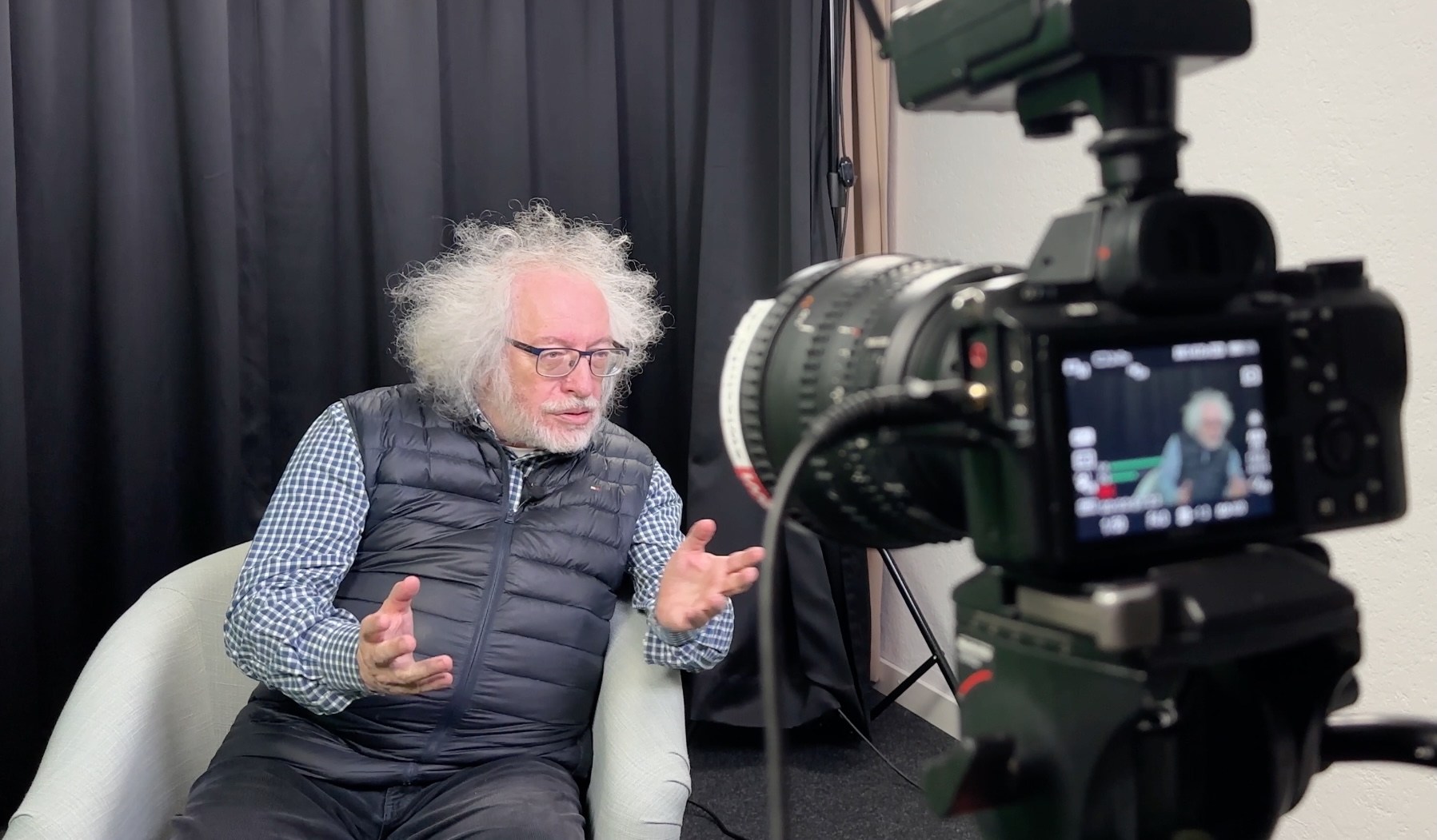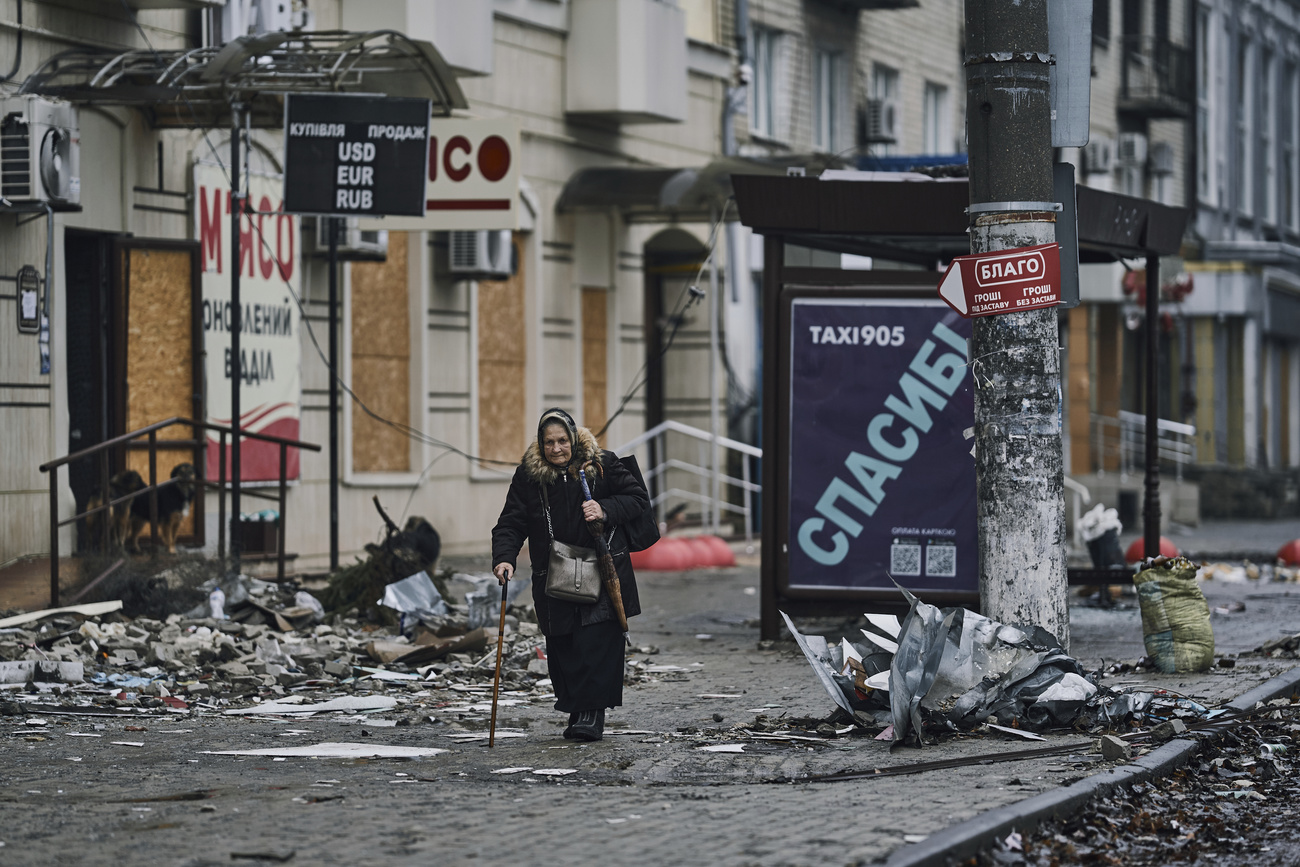
‘Switzerland has lost its opportunity to mediate for peace in Ukraine’

Despite facing threats, Alexei Venediktov, the former editor-in-chief of Echo of Moscow radio station, continues to work from Moscow to keep Russians informed about the war in Ukraine. He believes the European sanctions, which Switzerland also adopted, are counterproductive.
Let everyone speak, and speak with everyone – this is Alexei Venediktov’s motto. Until Russia invaded Ukraine, Venediktov was editor-in-chief of the radio station Echo of Moscow. The station had survived waves of media repression and was considered one of Russia’s few remaining independent media organisations.
But on March 3, 2022, several days after the invasion began, it was banned from the airwaves after it denounced the war. Venediktov spoke with SWI swissinfo.ch during a visit to Switzerland.
SWI swissinfo.ch: You have continued working from Moscow, via YouTube, since your radio station was shut down. Are you really still able to work as an independent journalist?
Alexei Venediktov: Yes, the war has not changed a journalist’s job, just as it has not changed a surgeon’s or a teacher’s. Before, during, or after the war – the job is always to explain diverse opinions, analyse and debate.
SWI: In March 2022, a month after the war began, you discovered a pig’s head and an anti-Semitic message in front of your apartment door. More recently, the head of Wagner, a Russian private army fighting in Ukraine, called you an enemy. Is your life in danger?
A.V.: Yes, I’m in danger. It’s not very pleasant, but these are the risks of the job. In my country, my profession is a risk. So I take this risk. Otherwise I’d have to change careers, emigrate, or retire, but I don’t want to do any of that.
SWI: You are currently in Europe. Are you thinking of staying?
A.V.: Not yet. I’m not ruling anything out because the threats are increasing. But as long as I can work in Moscow, I’ll stay there.
SWI: The Russian authorities have put you on their list of so-called foreign agents. What does that mean, in concrete terms?
A.V.: I don’t, for example, have the right to give lectures or visit a university or school to speak with students. People are also afraid to contact me since communicating with me is [considered] toxic, because they know I’m being watched. I’ve brought a lawsuit against the justice minister because it’s unjust to call me a foreign agent. I don’t even know which country I’m an agent for. Life is heavy.

More
Alexei Venediktov: My words carry more weight if I stay in Moscow
SWI: Paradoxically, opposition leader Alexei Navalny’s team has added your name to a list of “corrupt officials and warmongers”. It accuses you of having helped the regime falsify electronic-vote results in the 2021 elections for the State Duma [lower house of the Russian parliament]. How do you respond to this accusation?
A.V.: It’s a lie. They put me on that list because I’m doing investigative work. I think some people in Navalny’s entourage are working for the state. I’m looking for documents to prove it. In 2021, after his poisoning and his recovery in Germany, some people told Navalny to return to Russia, although in Moscow we knew he’d be imprisoned on his return. He did return and now he’s in prison and ill, maybe even dying.
SWI: Your Wikipedia page in French had claimed [before a recent modification to the text] that you were among the key figures supporting Vladimir Putin in the 2012 presidential election. Is that correct?
A.V.: That is absolutely false. A document shows that Putin asked me to join the leading figures who support him. Out of 300, I’m the only one who refused.
SWI: Yet you know Putin personally. You have met him on several occasions. You even used the familiar form of the pronoun “you” while speaking with him before he was elected. Do you still maintain contact with him or those close to him in the Kremlin?
A.V.: I last saw Putin in January 2021. I asked a question about Navalny’s arrest, which obviously didn’t please him. But I speak regularly with his spokesperson to ask him to clarify various government positions. That is my job.

SWI: The government accuses you of being a foreign agent while some in the opposition accuse you of being too close to power. Where does the truth lie?
A.V.: These accusations from the two opposing camps are proof that I’m doing my job well. Journalists shouldn’t side with a particular political force but can have friends in every party. For example, Putin’s spokesperson, Dmitri Peskov, is one of my good friends, but I also have friends who are in prison.
SWI: Echo of Moscow resisted the various waves of media repression for a long time. Did that require making compromises by cultivating a certain proximity to power?
A.V.: Of course we had to make compromises, but not in our editorial stance. That hasn’t changed in 23 years.
SWI: But the Gazprom group, which is close to the state, was a majority stakeholder in Echo of Moscow. Given this fact, were you really able to maintain journalistic independence?
A.V.: Of course. A journalist’s independence is not dependence on shareholders. When Gazprom took over the majority of the radio station’s shares in 2001, the opposition continued to join us on air because we were a professional news organisation. We’ve always given everyone the chance to speak their mind.
I did, however, once free a journalist from prison. He’d been falsely accused of selling drugs. To get him released, I had to speak with the minister of internal affairs and other officials. This isn’t normally something an editor-in-chief would do, but the man was set free. This is the type of compromise I make, so that people talk to each other instead of killing each other. In that sense I do compromise, and I will continue to do so.
SWI: In a recent Financial Times articleExternal link, you said you regretted not having seen the war coming. In retrospect, what kept you from recognising the warning signs?
A.V.: During a 2013 press conference, I told Putin that I could see symptoms of a Stalinist drift. He said I was crazy. As a history teacher, however, I recognised all of the signs: the war in Chechnya, the 2008 war in Georgia, the brutality, [and] Putin’s vanity.

Despite this, I believed corruption was the regime’s greatest vice. They want palaces, yachts, [and] Rolexes. But war? Impossible, I thought, since they want above all to live in luxury. I was wrong: the great defect of this regime is imperialism, revanchism. We didn’t see it because it was hidden under the corruption.
SWI: How does the Russian population get its news about what’s happening in Ukraine?
A.V.: Today, everyone can get information online. Information is not the problem; the problem is what you believe. The Russian population feels it has lost its greatness and that Putin will restore it. This prevents Russians from seeing the atrocities of this war. They don’t believe they’re occurring. They tell themselves: our brave soldiers cannot kill children, cannot bomb homes. Even those who have family in Ukraine don’t want to believe it. They think it’s all propaganda, that the Ukrainians are bombing their own cities.
SWI: On the first day of Russia’s invasion of Ukraine, you said on Echo of Moscow, “We’ve already lost the war.” Do you still believe that?
A.V.: Yes, of course! Russia has already lost. It has lost tens of thousands of soldiers and its international reputation, which is impossible to restore. The sanctions have also created economic losses. Even if there were a military victory, what good would it do us? I see only the losses.
SWI: Do you think the economic sanctions against Russia are having an impact?
A.V.: The sanctions that affect everyone with a Russian passport are incomprehensible and counterproductive. For example, wanting to exclude Russian athletes from the Olympic Games, even those who do not support the war, would mean sanctioning innocent people. This logic of collective responsibility is similar to the logic of Islamist terrorists. We must understand this and its consequences: Putin uses this to claim that the West is against all Russians. I don’t understand how that is supposed to help end the war.
SWI: Is there an end to this conflict?
A.V.: This conflict will never end. Maybe the military phase can be stopped, but I don’t see a way out of this war in the broader sense.
SWI: There is currently more than CHF46 billion ($49.8 billion) of Russian money in Switzerland. Has the Swiss government, in your opinion, done enough to sanction those close to power?
A.V.: Switzerland is acting in solidarity with Ukraine and the Western community. But freezing a bank account or assets should be a legal decision, not a political one. Here we’re confiscating before going to court. In my opinion, it should be the other way around. The risk here is that it’s creating a dangerous precedent. Today it’s with the Russians, tomorrow with the Chinese, and after that with others.
SWI: Switzerland has adopted European Union sanctions against Russia. Do you think it has maintained its status as a neutral country?
A.V.: Switzerland has lost its opportunity to mediate for peace. In the past, Swiss presidents could take on this role. But where is the current mediator between Russia and the West? Switzerland has tipped in favour of one camp.
SWI: Last question: if you were to meet Putin today, what would you say to him?
A.V.: Withdraw our army from Ukraine! You’ve made a mistake. After that we can discuss the status of Crimea, reparations, etc. But for now we must stop killing people – not just Ukrainians but also Russians. When you’re shooting, you cannot talk.
Translated from French by Katherine Bidwell/gw

More
Could Switzerland seize Russia’s foreign reserves for Ukraine reconstruction?

In compliance with the JTI standards
More: SWI swissinfo.ch certified by the Journalism Trust Initiative































You can find an overview of ongoing debates with our journalists here . Please join us!
If you want to start a conversation about a topic raised in this article or want to report factual errors, email us at english@swissinfo.ch.